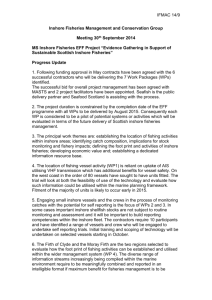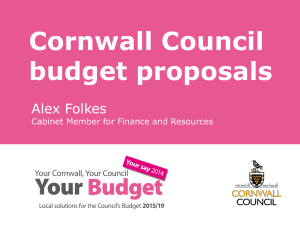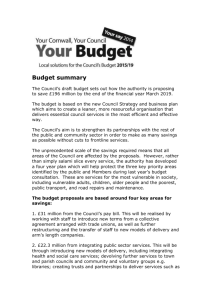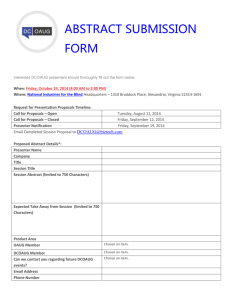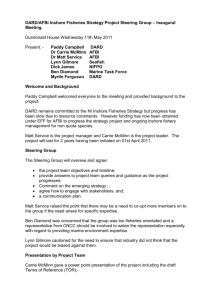Cornwall Inshore Fisheries and Conservation Authority
advertisement
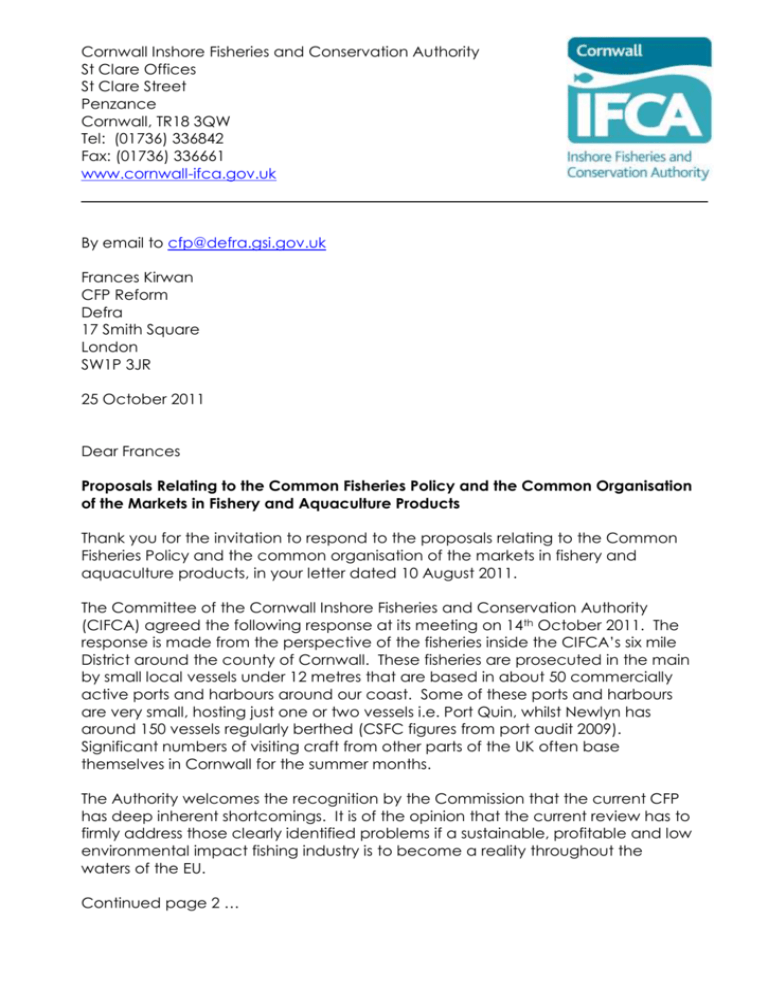
Cornwall Inshore Fisheries and Conservation Authority St Clare Offices St Clare Street Penzance Cornwall, TR18 3QW Tel: (01736) 336842 Fax: (01736) 336661 www.cornwall-ifca.gov.uk By email to cfp@defra.gsi.gov.uk Frances Kirwan CFP Reform Defra 17 Smith Square London SW1P 3JR 25 October 2011 Dear Frances Proposals Relating to the Common Fisheries Policy and the Common Organisation of the Markets in Fishery and Aquaculture Products Thank you for the invitation to respond to the proposals relating to the Common Fisheries Policy and the common organisation of the markets in fishery and aquaculture products, in your letter dated 10 August 2011. The Committee of the Cornwall Inshore Fisheries and Conservation Authority (CIFCA) agreed the following response at its meeting on 14th October 2011. The response is made from the perspective of the fisheries inside the CIFCA’s six mile District around the county of Cornwall. These fisheries are prosecuted in the main by small local vessels under 12 metres that are based in about 50 commercially active ports and harbours around our coast. Some of these ports and harbours are very small, hosting just one or two vessels i.e. Port Quin, whilst Newlyn has around 150 vessels regularly berthed (CSFC figures from port audit 2009). Significant numbers of visiting craft from other parts of the UK often base themselves in Cornwall for the summer months. The Authority welcomes the recognition by the Commission that the current CFP has deep inherent shortcomings. It is of the opinion that the current review has to firmly address those clearly identified problems if a sustainable, profitable and low environmental impact fishing industry is to become a reality throughout the waters of the EU. Continued page 2 … … page 2 … Turning to Defra’s questions the responses for questions relevant to this authority are as follows. Q1 Are the aims of the CFP set out clearly and appropriately in these proposals, with the right balance between environmental, social and economic objectives? The aims of the CFP are set out clearly in the proposals and the balance between environmental, social and economic objectives are relatively sensible. However, the Authority notes that the Commission continues to insist that the fleet is too large for the available resources. Although we are not in a position to comment on the wider EU fleet numbers, Members note that the indigenous inshore UK fleet has reduced significantly over the last decade or so, to the point that some small ports are a shadow of their former selves. It was hoped that the emphasis on reducing discards would bring renewed thinking on this issue, as theoretically, more fish will be able to survive for another day and therefore the stocks levels will benefit as a result. Q2 What are your views on the proposed content of multi-annual plans and the process to deliver management measures under these plans? No comments. Q3 Have the proposals got it right on ending fish discards? If not, what changes would you suggest? There is general support to end discards. However, the proposals need to be thought through fully, otherwise there will be a significant likelihood that some smaller vessels will inadvertently contravene the principle due to them landing in very small ports with no facilities for unsaleable fish. That even assumes they will have capacity aboard their smaller vessels to store all the fish that is caught so that it can be taken to a port. Technical measures must be the preferred method of reducing discards, through increased mesh sizes, restricted lengths of fixed gear/numbers of pots, closed seasons, curfews etc. Fishermen also need to be helped and encouraged to change to less impactive methods of fishing where that is at all feasible and viable. Increased minimum sizes for crustaceans are a particularly valuable technical method for increasing stocks, as evidenced by the improved situation in the Cornwall inshore zone over the last decade. Of course, discards per se in the shellfish fishery is not an issue as all undersized animals that are caught are very robust and will survive if returned to the water. Continued page 3 … … page 3 … Q4 Do the proposals give sufficient flexibility to manage fisheries on a regional basis, with an appropriate voice for stakeholders? If not, what changes might be necessary? Members are of the opinion that the importance of small-scale and coastal fisheries needs to be fully recognised through a differentiated management regime. Inshore fisheries in our view should be managed as small logical units, or cells, around Europe’s coasts for the benefit of the marine environment and all the stakeholders including commercial, recreational and the general public. The inshore commercial sector consists mainly of diverse micro-businesses which are not represented very well by the Fish Producers Organisations (FPO) or fishermen’s associations. This sector needs to be encouraged or required to join such groups, otherwise its feeble voice will be drowned out by the voices of the larger vessel operators who are much better organised. The interests of the two sectors (inshore and offshore) are not always the same and so there is a great danger that the smaller vessels will continue to be under represented in national and international discussions unless there is a concerted effort to address the situation. Q5 What are your views on the proposal to introduce “transferable fishing concessions” for vessels over 12m and those which used towed gear? Are the provisions for Member States to decide on allocations and set safeguards on trading appropriate/sufficient? The Authority holds some concerns that the transferable fishing concessions will ultimately create an relatively small, but highly efficient EU fleet that is owned by just a few large companies. This is the experience of other countries where this principle has been applied i.e. New Zealand, and despite there being a political will to set safeguards on trading, where quotas of any commodity are in effect made tradeable, the natural economic realisation is always that the quota will eventually end under the control of a few interests that have the financial resources to outbid other interested parties. The fact that the EU fleet is riddled with “flag” vessels despite various MS national measures being introduced to resist them, demonstrates the reality. Of particular concern is the exclusion of the under 12m trawlers from the proposed exemption from the transferable fishing concessions. The inshore trawlers have reduced significantly in our locale over the last two decades and if that part of the sector is not exempted from the proposals, then it will become all but extinct very quickly. Continued page 4 … … page 4 … Q6 Are the proposals to help develop the aquaculture industry necessary, and the steps suggested helpful? The proposals for aquaculture are welcomed. Shellfish cultivation in Cornwall is small but the product is of high quality. New investment has been made over the last two or three years, and there is capacity to extend aquaculture more in the county as identified in a South-West Pesca report and other studies over the last decade or so. Future development must be sympathetic with the local marine environment and with the activities of other stakeholders. Nevertheless, unless a national strategic aquaculture plan is fully developed and accepted by the industry and government, significant investment to realise the potential is unlikely to happen. Water quality issues are frequently the Achilles heel for the aquaculture sector, despite huge investment by water utilities. Q7 Do these proposals go far enough to ensure the sustainability of EU fishing activity in external, non-EU waters? If not, what other measures are necessary? No comment as it is outside our remit and area of direct interest. Q8 Do you think that quota management and marketing responsibilities for producer organisations should be brought out and strengthened in the legislation? No comment as it is outside our remit and area of direct interest. Q9 Are the proposals consistent with current, wider consumer information and labelling requirements? (If not, how should they be made consistent or will they place additional burdens on the industry). No comment as it is outside our remit and area of direct interest. Q10 Should additional voluntary information be included in the proposals? No comment as it is outside our remit and area of direct interest. Q11 Do you think that intervention mechanisms should continue to be part of the new marketing regulation? (If so what form should this be in e.g. temporary or permanent) No comment as it is outside our remit and area of direct interest. Continued page 5 … … page 5 … Q12 Will these proposals place additional burdens and costs on stakeholders? If so can you provide an estimate of what those additional costs could be? It is felt that the proposals will likely place some additional burden and costs on stakeholders. It is not possible though for us to comment on what these are likely to be and it is considered that the onus is on those that are most likely to be impacted, to feed in what they estimate the burdens and costs to be. Yours sincerely Edwin Derriman Chief Officer

